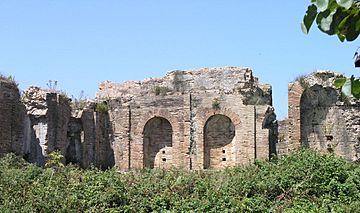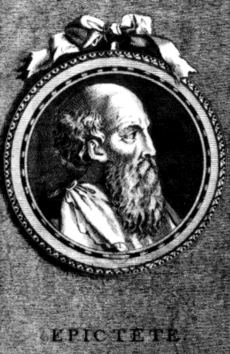Epictetus facts for kids
Quick facts for kids
Epictetus
|
|
|---|---|
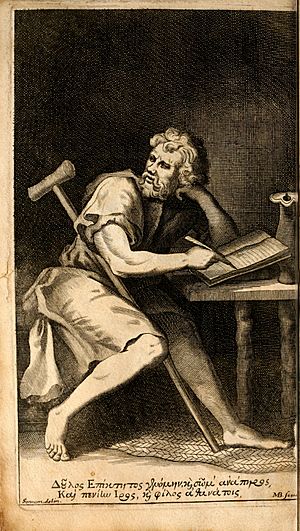
Artistic impression of Epictetus, including his crutch
|
|
| Born | c. AD 50 |
| Died | c. 135 (aged c. 85) |
|
Notable work
|
|
| Era | Hellenistic philosophy |
| Region | Western philosophy |
| School | Stoicism |
|
Main interests
|
Ethics |
|
Notable ideas
|
Memento mori |
|
Influences
|
|
|
Influenced
|
|
Epictetus (/ˌɛpɪkˈtiːtəs/; Greek: Ἐπίκτητος, Epíktētos; c. 50 – c. 135 AD) was an important Greek Stoic philosopher. He was born into slavery in Hierapolis, a city in what is now Turkey. He lived in Rome for a time. Later, he moved to Nicopolis in northwestern Greece, where he spent the rest of his life.
Epictetus's ideas were written down by his student Arrian. These writings became two famous books: Discourses and Enchiridion. Epictetus taught that philosophy is not just about thinking. It is a way of life. He believed that we cannot control outside events. But we can control how we react to them. He taught that we should accept what happens calmly. He also believed we are responsible for our own actions. We can control these actions through strong self-discipline.
Contents
Epictetus's Early Life and Freedom
Epictetus was born around 50 AD. His birth name is unknown. The name "Epictetus" means "gained" or "acquired" in Greek. He spent his youth in Rome as a slave. His owner was Epaphroditus. Epaphroditus was a rich freedman (a former slave who gained freedom). He worked for the Roman emperor Nero.
Epictetus loved philosophy from a young age. His owner allowed him to study Stoic philosophy. His teacher was Musonius Rufus. This education helped him gain a higher social standing. At some point, Epictetus became disabled. Some say his leg was broken by his master. Others say he was disabled since childhood.
Epictetus became free after Emperor Nero died around 68 AD. He then started teaching philosophy in Rome. Around 93 AD, the Roman emperor Domitian sent all philosophers away from Rome. Epictetus moved to Nicopolis in Epirus, Greece. There, he started his own philosophy school.
Epictetus's Teachings and Students
Epictetus's most famous student was Arrian. Arrian studied with him around 108 AD. Arrian wrote down what Epictetus taught. He said his book, Discourses, was like notes from Epictetus's lectures. Arrian described Epictetus as a powerful speaker. He could make his listeners feel exactly what he wanted.
Many important people wanted to talk with Epictetus. Emperor Hadrian was friendly with him. He might have even heard Epictetus speak at his school. Epictetus lived a very simple life. He had few things. He lived alone for a long time. But when he was old, he adopted a friend's child. He raised the child with the help of a woman. It is not known if they were married. Epictetus died around 135 AD.
Epictetus's Main Ideas
Epictetus himself did not write any books. His student Arrian wrote down his teachings. The main work is The Discourses. Four of the original eight books still exist today. Arrian also made a shorter version called the Enchiridion, or Handbook.
Epictetus believed that the most important part of philosophy is knowing yourself. This means understanding what you don't know. He taught that Logic helps us think clearly. But it is less important than practical living. The first step in philosophy is to live by good rules, like not lying. The second step is to understand why these rules are good. The third step is to prove why these reasons are correct.
What We Can Control
Both The Discourses and The Enchiridion start with a key idea. They separate things that are in our power from things that are not.
- Things in our power: These are our thoughts, choices, desires, and dislikes.
- Things not in our power: These are things like our body, possessions, reputation, and what others think of us.
Our ability to choose (called prohairesis) helps us decide what is good or bad. This choice comes from our reason. Reason is the part of us that can see and test itself and everything else.
Epictetus taught that we should not be upset by loss. If something is lost, it was not truly ours to begin with. It was something outside our control. Our feelings like crying or complaining are just our opinions. They come from believing that things outside our control can be good or bad. But they cannot. If we reject these opinions, we can find peace of mind. This peace is possible in any situation.
The Power of Reason
Epictetus believed that only Reason is truly good. Anything against reason is bad. A good person should work on improving their own reason. This is something we can control. Fighting against bad opinions with good ones is a noble struggle. This struggle leads to true freedom and peace of mind (ataraxia). It also helps us control our emotions (apatheia). We should be careful about pleasure. It can seem sweet, but it can lead us astray. So, the first goal of philosophy is to clear our minds.
Epictetus taught that everyone has ideas about what is good and bad. Everyone agrees that good things are helpful and bad things are harmful. Problems happen when we apply these ideas to specific situations. Philosophy helps us find a clear standard for good and evil. This is easier because only our minds and thoughts are truly in our power. Everything else, like possessions, is outside our control.
Living in Harmony
Epictetus believed that a divine power is good. We have been given everything good we could have. This includes our soul and reason. With reason, we can achieve greatness. We can even be like the gods. So, we should take great care of our minds. If we only want what God wants, we will be truly free. Everything will happen as we wish. We will be as free as Zeus himself.
Every person is connected to the rest of the world. The universe is made for harmony. Wise people will not just follow their own will. They will also follow the right order of the world. We should live our lives by doing our duties. These include duties as children, siblings, parents, and citizens.
We should be ready to face great difficulties for our country or friends. A good person, if they could see the future, would calmly accept sickness, injury, or even death. They would know this is the correct order of the universe. We all have a role to play in the world. We have done enough when we do what our nature allows. By using our abilities, we can understand our destiny.
Epictetus said we are like travelers at an inn. We should take what is offered with thanks. Sometimes, we might refuse something. In both cases, we are good guests. Anyone who finds life too hard is free to leave it. But we should not give up our role without a good reason. A Stoic wise person will never find life unbearable. They will not complain about anyone, human or divine. We should forgive and be kind to those who make mistakes. They make mistakes because they are ignorant, like being blind.
Only our opinions and beliefs can make us unhappy. Only ignorant people find fault with others. Every desire can make us feel less worthy. It can make us slaves to what we desire. We should remember that all outside advantages are temporary. Even when we enjoy them, we should remember they are not truly ours. If we are prepared this way, our opinions will not control us.
The Enchiridion ends with this advice: "Always have these rules ready":
- Some things are in our power, others are not.
- Do not be troubled by things outside your control.
- Focus on what you can control: your thoughts and actions.
Epictetus's Influence
Epictetus's ideas have inspired many people throughout history.
Emperor Hadrian's Dialogue
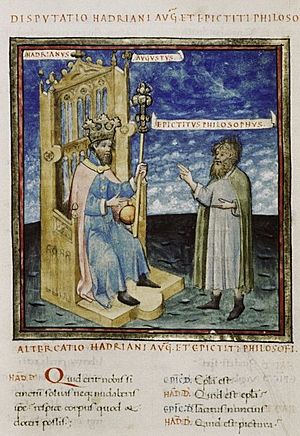
Epictetus appears in a short Latin text from the 2nd or 3rd century. It is called Dialogue between the Emperor Hadrian and Epictetus the Philosopher. This text has 73 short questions supposedly asked by Hadrian. Epictetus answers them. This dialogue was very popular in the Middle Ages.
Impact on Other Philosophers
Marcus Aurelius
The Roman emperor Marcus Aurelius (121 to 180 AD) was greatly influenced by Epictetus. Marcus Aurelius mentions Epictetus in his own famous book, Meditations.
French Enlightenment Thinkers
Many important thinkers of the French Enlightenment read Epictetus. These include Voltaire, Montesquieu, Denis Diderot, and Baron d'Holbach. They all read the Enchiridion when they were students.
Influence in Literature
Epictetus's philosophy is important in the 1998 novel A Man in Full by Tom Wolfe. A character named Conrad ends up in jail. He finds a copy of the Enchiridion of Epictetus. This Stoic handbook helps him become strong and honorable.
A line from the Enchiridion is used in The Life and Opinions of Tristram Shandy, Gentleman by Laurence Sterne. It translates to: "Not things, but opinions about things, trouble men." Epictetus is also mentioned in books by James Joyce and J. D. Salinger.
Military Inspiration
James Stockdale
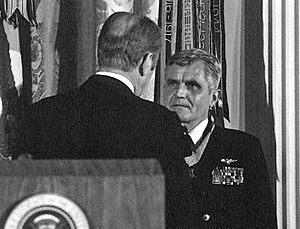
James Stockdale was a fighter pilot in the Vietnam War. He was shot down and captured. He said Epictetus's philosophy helped him stay sane during his seven and a half years as a prisoner. When he bailed out of his plane, he reportedly said, "I'm leaving the world of technology and entering the world of Epictetus!"
Psychology and Religion
Psychologist Albert Ellis created Rational Emotive Behavior Therapy. He said Epictetus's ideas helped form the basis of his therapy system.
Kiyozawa Manshi was a reformer in a branch of Jodo Shinshu Buddhism. He named Epictetus as one of the three main influences on his spiritual journey.
See also
 In Spanish: Epicteto para niños
In Spanish: Epicteto para niños
 | Frances Mary Albrier |
 | Whitney Young |
 | Muhammad Ali |


